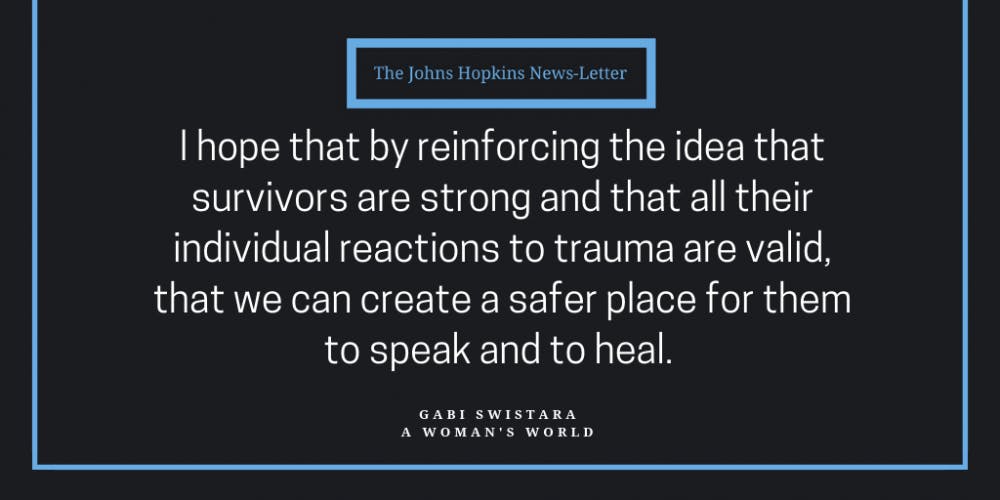
We don’t talk about what makes us uncomfortable, but we should. Sexual assault is not a new phenomenon. It is not, and never will be, a result of the way someone dresses or the way someone acts. Burkas and ball gowns know assault just as booty shorts do. The male gaze is as pertinent as ever; the powerful gazing upon the marginalized as if their stares can strip autonomy. It’s the 21st century and survivors are just now finally gaining space to be able to share their experiences.
The narratives of marginalized women have been ignored for so long. Persistent struggles go unnoticed — when people think of trauma, they do not necessarily think of something that happens every single day in our country, namely, rape.
One in five women are survivors of sexual assault and every 92 seconds, an American woman is sexually assaulted. Take a moment to think about the women in your life and count them off: your mother, your grandmother, your aunt, your little sister, older sister, girl from class, female professor, best friend or the musician you hear on the way to class. In this list alone, there are statistically at least two survivors.
As a survivor, I often felt as though my experience was discredited simply because of its prevalence. So many people are sexually assaulted and I felt as though other survivors were doing fine, so why wasn’t I?
I came to realize that it wasn’t that I was broken, but that I didn’t know how other survivors were doing. We don’t exactly publicize our struggles to the world. This article is one of the first instances of me publicizing even my identity as a survivor.
The facts are that PTSD is more prevalent in survivors than soldiers and that PTSD is more common in women than men (by more than double).
For me, PTSD manifested in a number of ways. My hope is that by sharing some of these responses, people can become more receptive of what the survivors in their lives are going through and, in turn, validate their own very real traumatic consequences.
For a while after my assault, hearing about a hookup brought me to tears. People kissing on a screen made me turn the TV off. I would change my clothes in steps, making sure there was never a time that I was fully undressed. I would wear baggy clothes and long pajama pants to bed, compared to my prior boxer-shorts sleepwear. I found myself feeling dirty at times so I would go home and layer myself in sweatpants and hoodies to make sure I was covered. I wanted to shrink into myself; I no longer felt safe in my own body.
The weight of knowing your body was, for a moment, more object than living, breathing being was difficult to say the least. I would check that the doors were locked three times before I went to bed. I’d lock the front door, my bedroom door, my bathroom door, check them from the hallway, check the front door again, go outside on the balcony so I can come back in and lock that door for sure, too, then check the front door again. All this before I can go to sleep and, even then, I slept with a knife beside my bed for months.
In public settings, I was always worried that people would attack me for little things. On vacation, I once accidentally took an old couple’s heating lamp away from them and feared that they would hurt me. Irrational as this delusion may seem, it came from a very valid and very real place. Although I was high functioning, the assault triggered anxiety and a diagnosed panic disorder.
It’s difficult for me to share but it’s important for people to know that while the perpetrator goes on living, the survivor often has real impediments in their life and functioning. Let me turn, for a moment, to our current political climate. A terrifying climate in which we place trust and power in the hands of our abusers.
Look at the Kavanaugh-Ford case where a violent attacker made it to the Supreme Court. Or look at our own Obarrio case here at Hopkins: 2,000 students signed a petition to let go of a violent assailant and the administration has not been transparent. Or Betsy DeVos’s new proposed Title IX policies, where mediation would be possible in cases of rape.
Imagine for a moment that an American soldier, tortured in prison camps now diagnosed with Post-Traumatic Stress Disorder, is told to sit down and essentially ‘work it out’ with their terrorist.
My point, of course, is not to diminish the experience of soldiers. My point is to, using a very bold analogy, highlight the exerience of survivors: The prevalance of sexual assault should in no way strip its severity.
#MeToo has given survivors the space to speak out. But it is still incredibly difficult for women to come forward — about three out of four cases of assault go unreported, and not all reported cases are investigated. If a survivor you know decides to report, they are brave, and if a survivor you know decides not to report, they are brave.
People are called survivors for a reason — because sexual assault is an act of violence and an act of trauma and psychologically speaking, it kicks ‘victims’ into a similar set of symptoms that soldiers feel after warzones.
I do not make these claims in any attempt to call out survivors or remind them of their difficulties. Rather, I hope that by reinforcing the idea that survivors are strong and that all their individual reactions to trauma are valid, that we can create a safer place for them to speak and to heal.





